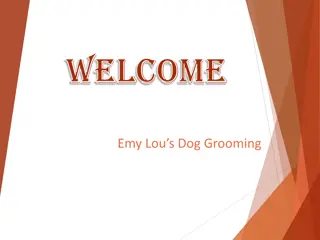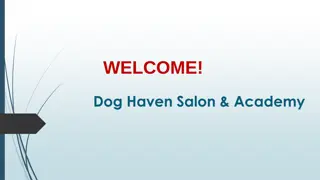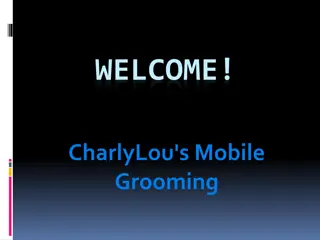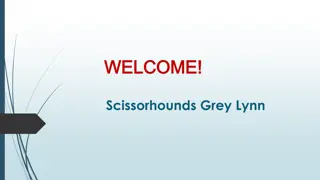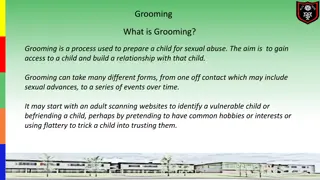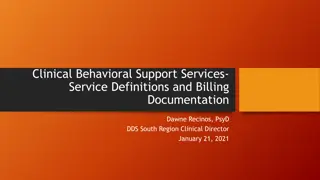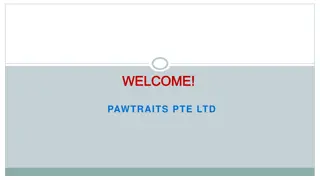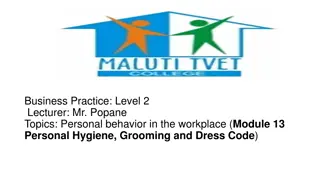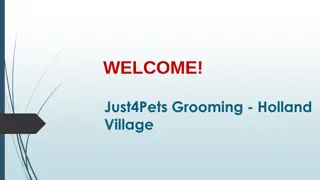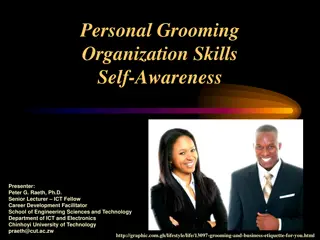Mastering Personal Grooming and Behavioral Skills for Success
Explore the world of personal grooming, understand why it's crucial for creating a positive self-image, and learn about the impact of grooming on professional perceptions. Dive into essential behavioral and interpersonal skills like eye communication, posture, gestures, and facial expressions to enhance your overall presence and communication effectiveness.
Download Presentation

Please find below an Image/Link to download the presentation.
The content on the website is provided AS IS for your information and personal use only. It may not be sold, licensed, or shared on other websites without obtaining consent from the author. Download presentation by click this link. If you encounter any issues during the download, it is possible that the publisher has removed the file from their server.
E N D
Presentation Transcript
What is Personal Grooming? How people learn? 2
Importance of Personal Grooming Why personal grooming is important? For positive self-image, and to encourage and assist to maintain pleasing and attractive appearance 3
Grooming Levels Personal Level Group Level Organization Level 4
Personal Grooming Clean hair and styled appropriately Clean nails, skin and teeth Dress, and Women wear make-up (depends on field) 5
People Perceptions from Groomed Appearance Professionalism Level of sophistication Intelligence Credibility or Reliability, and Respect 6
Interpersonal Communication is an art rather than a science
Nine Behavioral Skills 1. Eye communication 2. Posture and movement 3. Gestures and facial expressions 4. Dress and appearance 5. Voice and vocal variety 6. Language and pauses 7. Listener involvement 8. Humor 9. Natural self
Eye Communication Look sincerely with other person Intimacy, Intimidation and Involvement Five seconds for more effectiveness Beware of an eye dart Beware of slow-Blink, and Look on the nose bridge right in the middle of the eyes
Posture and Movement Stand tall Watch lower body Use the Ready position Move, and Use your own style
Gestures and Facial Expressions Learn to be relaxed and natural when you speak Find out own habit Find out own nervous gestures Do not over-exaggerate Smile, and Remember personality factor
Dress and Appearance Be appropriate Dress at conscious level Dressing means a lot to audience Pick few people to know well Nobody will tell you, and Pick new outfit, try a new look
Voice and Vocal Varity Use voice as effective tool, not a barrier Now it is time to change, and Record yourself
Voice and Vocal Varity A single change in variation may change the meaning Example: I was born in Pakistan You were born somewhere else I was born in Pakistan How dare you imply that I wasn t? I was born in Pakistan I m a native not a newcomer I was born in Pakistan Not outside Pakistan I was born in Pakistan Not in New Zealand
Language and Pauses Use appropriate and clear language with planned pauses Use direct language Vocabulary increases with use Beware of Jargon, and Pause- an important tool
Listener Involvement Maintain active interest Involve each person Enhance your style Engage in interaction, and Plan contents ahead
Humor Create a bond with listeners Enable them to enjoy listening Don t tell jokes Do tell stories, and Be aware of feedback
Natural Self Be authentic Understand your strength Convert your weaknesses into assets Learn like a juggler, and Communication is a lifelong process
What are Soft Skills? Wikipedia defines soft skill as cluster of: Personality traits Social graces Communication Language Personal habits Friendliness, and Optimism that characterize relationships with other people
What are Soft Skills? MindTools defines soft skill as Work ethic Attitude Communication Emotional intelligence, and A whole host of other personal attributes
Wikipedia Personality traits Social graces Communication Language Personal habits Friendliness, and Optimism MindTools Work ethic Attitude Communication Emotional intelligence, and A whole host of other personal attributes
1. Growth Mindset 2. Self-awareness 3. Emotion Regulation 4. Self-Confidence 5. Stress Management 6. Resilience 7. Skills to Forgive and Forget 8. Persistence and Preservance 9. Patience, and 10.Perception
11. Communication Skills 12. Teamwork Skills 13. Interpersonal Skills 14. Presentation Skills 15. Meeting Management Skills 16. Facilitating Skills 17. Selling Skills 18. Management Skills 19. Leadership Skills, and 20. Mentoring / Coaching Skills
Development of Personal Traits
21. Managing Upwards 22. Self-promotion Skills 23. Skills in Dealing with Difficult Personalities 24. Skills in Dealing with Difficult/Unexpected Situations 25. Ability to Handle Office Politics 26. Influence / Persuasion Skills 27. Negotiation Skills, and 28. Networking Skills
Take Home Soft Skills list is daunting one Don t worry if you don t have all of them Most of us don t Important thing is to understand why soft skills are important to your career success ask yourself what soft skills do you already possess, and which ones do you want to develop next






